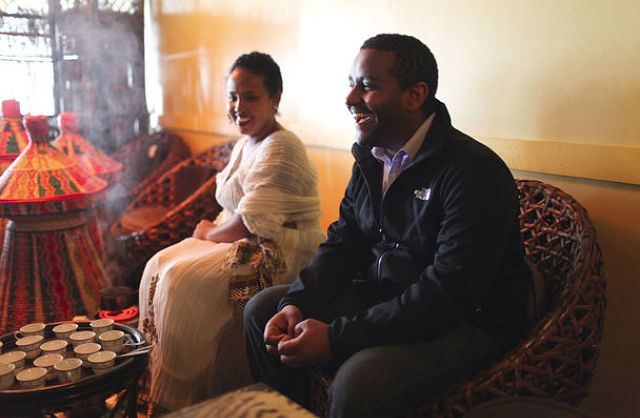 Amen Gibreab, right, the director of a documentary about Ethiopia, sits next to Fanaye Debalke at Gojo Ethiopian Restaurant in Seattle. (Alex Stonehill/The Seattle Globalist)
Amen Gibreab, right, the director of a documentary about Ethiopia, sits next to Fanaye Debalke at Gojo Ethiopian Restaurant in Seattle. (Alex Stonehill/The Seattle Globalist)
By Sarah Stuteville
Many Americans think in broad, and often grim, generalizations about Ethiopia specifically and Africa overall. One local Ethiopian-American filmmaker and a small group of college students are hoping to challenge those stereotypes….
Traveling to Ethiopia changed me forever. In the two months I worked there in 2008, I met a proud country that had fought off Italian colonialists, a diverse nation that communicates in more than 80 languages and a complex people who challenged my assumptions and helped shape how I see the world today.
But that wasn’t what I was expecting. I grew up in the 1980s and ’90s, decades that saw famine and political unrest in Ethiopia, as well as growth to our region’s significant Ethiopian-American population. For me, Ethiopia was a country that evoked images of starving children, refugees and war.
And I’m not alone. Many Americans think in broad, and often grim, generalizations about Ethiopia specifically and Africa overall. One local Ethiopian-American filmmaker and a small group of college students are hoping to challenge those stereotypes.
“Some students … all they knew of Africa was famine, terrorism, a lion and a tree,” says 25-year-old Amen Gibreab over strong cups of Ethiopian coffee at Gojo — an incense-saturated restaurant tucked into a strip mall in North Seattle.
Two years ago, a group of 15 UW Bothell students met with Gibreab and the founder of the program, professor Panagiotis “Panos” Hatziandreas, in this very spot to discuss the first Seattle-area study-abroad program to Ethiopia. It was a trip that would focus on re-imagining Ethiopia for a new generation, and Gibreab, a media and communication major and aspiring filmmaker, knew he had to document it.
Read more at The Seattle Times »
—
Join the conversation on Twitter and Facebook.

























